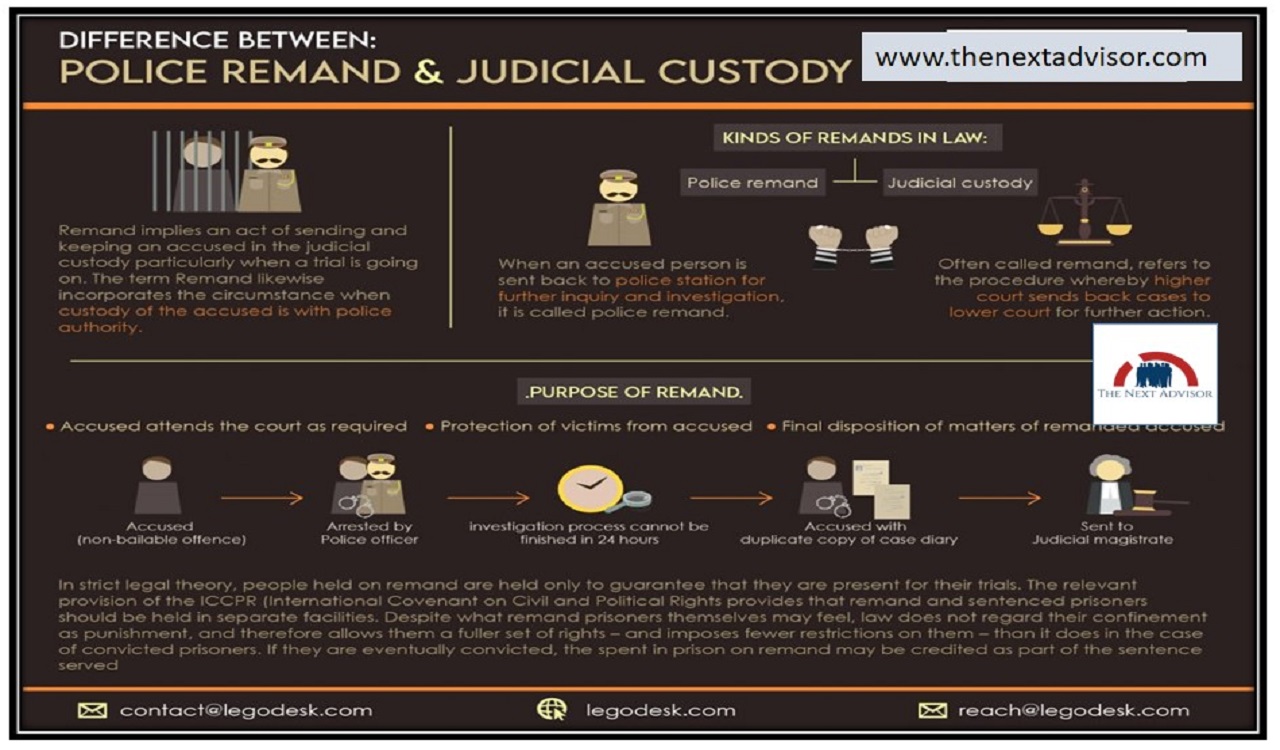Police Remand
JUDICIAL CUSTODY AND POLICE CUSTODY – RECENT TRENDS.
The word ‘custody’ means apprehending someone for protective care. In case, you are in charge of a room with some kids and you find the acts of one of those kids dangerous to other kids, you’ll want to tie the arms of that kid and make him sit away from other kids. So this is the principal behind arresting the suspect of a crime, to save other people in society. The words “custody” and “arrest” are not synonymous. It is true that in every arrest there is custody but vice versa is not true. The mere utterance of words, gestures, or flickering of eyes does not amount to arrest. Actual seizure or touch of a person’s body to arrest is necessary. Arrest, remand, and bail are components related to the investigation. They generally come into play as an aid to investigation. Arrest directly curtails the personal liberty of an individual. It strikes at his freedom. Therefore, many times unwarranted arrests have reached courts of law. There have been occasions when unlawful detention has been considered a violation of fundamental rights and compensation thereof has been paid. Several provisions incorporate safeguards for illegal arrest. If the method of arrest is not performed as prescribed by Sec. 46, the arrest would be nugatory.
POLICE CUSTODY:
When following the receipt of an information/complaint/report by police about a crime, an officer of police arrests the suspect involved in the crime
reported, to prevent him from committing the offensive acts further, such an officer brings that suspect to the police station, it’s calls Police Custody.
1 It is the custody of a suspect with the police in jail at the police station, to detain the suspect. During this detention, the police officer in charge of the case may interrogate the suspect and this detention is not supposed to be longer than 24 hours. The officer in charge of the case is required to produce the suspect before the appropriate judge within 24 hours, these 24 hours exclude the time of necessary journey from the police station to the court.
What is the meaning of Judicial Custody?
Police Custody means that the police have the physical custody of the accused while Judicial Custody means an accused is in the custody of the concerned Magistrate. In the former, the accused is lodged in a police station lockup; in the latter, it is the jail. When the Police take a person into custody, the Cr. P.C. kicks in and they were produced him/her before a Magistrate within 24 hours of the arrest. Difference between Judicial Custody and Remand: Police Custody means that the police have the physical custody of the accused while Judicial Custody means an accused is in the custody of the concerned Magistrate. In the former, the accused is lodged in a police station lockup; in the latter, it is the jail.
What happens after Judicial Custody:
A person may be held in the custody of the police or judicial custody. … The first thing that happens to a suspect on arrest is that he is taken into police custody, following which he is taken before a magistrate and he may either be remanded to judicial custody or be sent back into police custody.
What is the difference between Police Custody and Judicial Custody in the Criminal Procedure code? How long can an accused be detained under police or Judicial Custody? When a person accused of a cognizable offense is arrested and detained by the police and produced within 24 hours(excluding traveling time from the place of arrest), or he surrenders before the nearest Magistrate. Then the Magistrate can either release him on bail or he can either send him to judicial custody or police custody. If the accused is juvenile, his age is to be ascertained and if he finds that he is juvenile, then he is directed to be produced before Juvenile Justice Board.
LAWS OF CUSTODY IN INDIA The provisions for holding a person in custody for further investigation, in India are governed by Section 167 of the Code of Criminal Procedure. Section 167 of the Code allows that a person may be held in the custody of the police for 15 days on the orders of a Magistrate. A Judicial Magistrate may remand a person to any form of custody extending up to 15 days and an executive magistrate may order for a period of custody extending up to 7 days. A person may be held in the custody of the police or judicial custody. Police custody may extend only up to 15 days from the date custody begins but judicial custody may extend to a period of 90 days for a crime that entails a punishment of death, life imprisonment, or a period of imprisonment exceeding 10 years and 60 days for all other crimes if the Magistrate is convinced that sufficient reasons exist, following which the accused or suspect must be released on bail.
IS POLICE CUSTODY REMAND AFTER THE FIRST 15 DAYS WHETHER PERMISSIBLE?
Cr.P.C. S.167(1), S.397(2) – Police Custody Remand (PCR) – Lapse of the initial period of 15 days – Accused granted bail. If the accused is not in jail the for whole first 15 days then he can be remanded in P.C.R. even after lapsed the first 15 days. (Para 10, 11) Alim A. Patel Vs. State of Maharashtra 2011 (2) AIR BOM R 271.

























